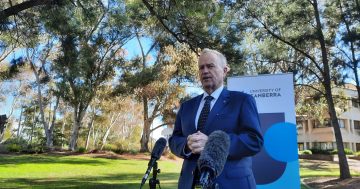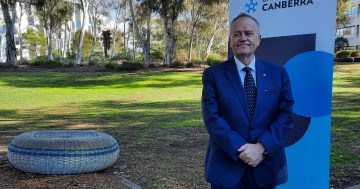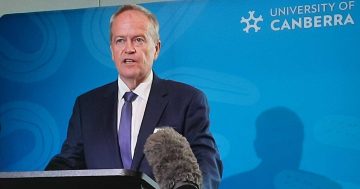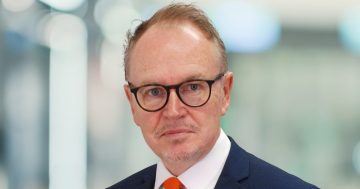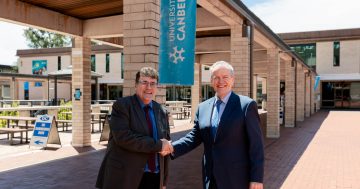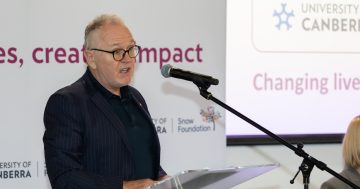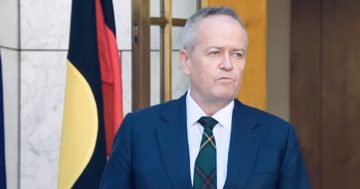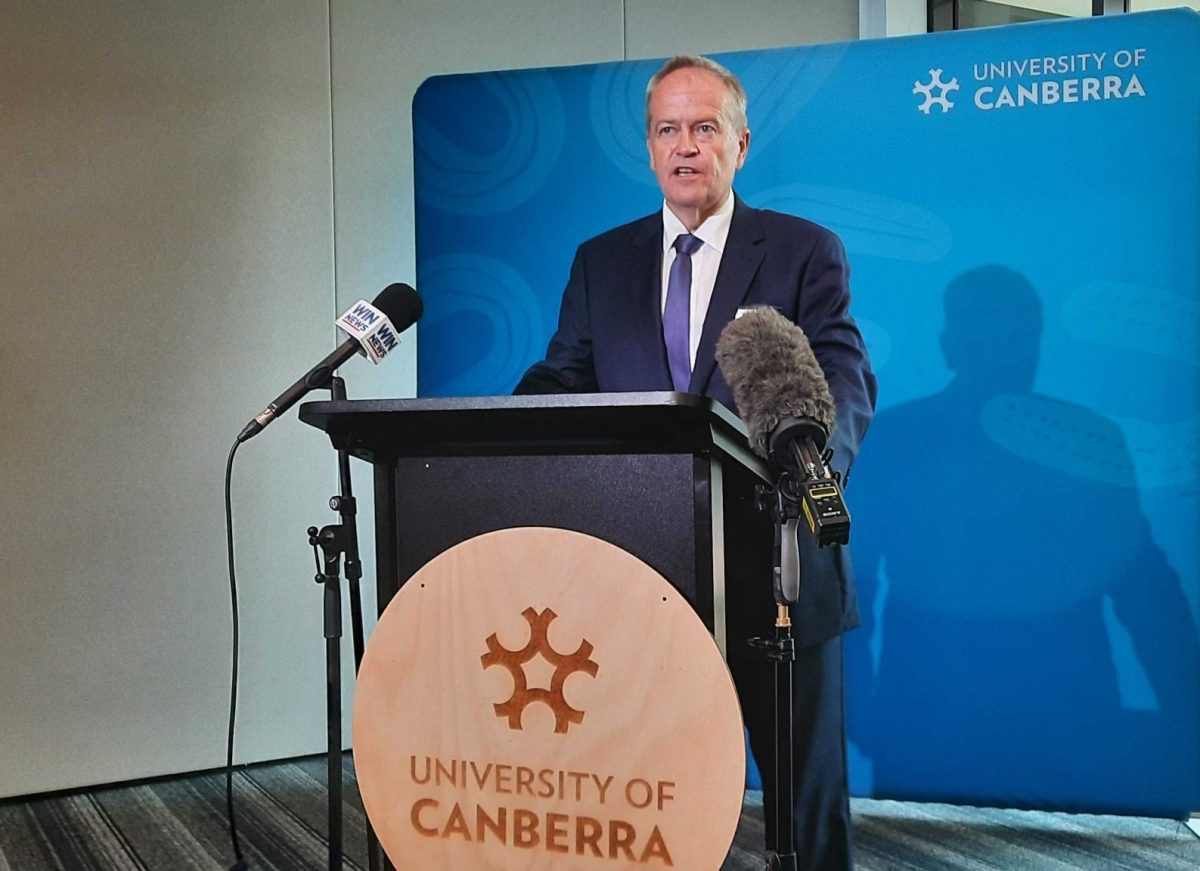
University of Canberra vice-chancellor Bill Shorten wants to make an impact and he isn’t going to die wondering. Photo: Ian Bushnell.
Bill Shorten’s tenure as University of Canberra vice-chancellor is somewhat of an experiment.
A career union leader and politician, Mr Shorten understands that his CV is not the standard one for such a role.
But he’s the right person for the times, he says.
The times, unfortunately, are difficult for UC, like many other campuses.
Financially challenged with an austerity program underway to reduce its wages bill and streamline operations, UC is cutting staff and courses.
There are also legacy governance issues, with Chief Minister Andrew Barr writing to the ACT Auditor-General late last year suggesting a performance audit, and a Legislative Assembly review looming.
There is no questioning Mr Shorten’s enthusiasm and passion, clearly on display at his investiture on Friday (14 February), but can a higher education outsider like him not only right the ship but steer the university to a better future?
He may have been a union leader, but Mr Shorten is also a law graduate of Monash University.
His rise to AWU national secretary and then 17 years in Parliament, including six as Labor leader, bring a lot to the table and was more than enough to convince the UC Council.
In fact, if your institution is in a hole and someone who has been a cabinet minister and could-have-been prime minister wants to help, how could you possibly refuse, even if former politicians tend to opt for the ceremonial role of chancellor rather than the wheelhouse.
Mr Shorten himself remains intensely ambitious and says he has a lot left to give.
So what kind of leader will he be and how is he going to turn UC around beyond getting the finances in order?
In his investiture speech, Mr Shorten said he had more questions than answers and wasn’t about to rule by edict, saying broad acceptance is vital to the legitimacy that was a pre-requisite for meaningful, enduring change.
But he isn’t about to shy away from the tough decisions. Nor is he likely to be a quiet behind-the-scenes operator, pledging to be an advocate for UC and the university sector in general.
Where will he take UC, apart from “the next level” and having an aspiration to excellence?
It is the earliest of days, so Mr Shorten has spoken mostly in generalities but there are some bones to chew on.
At the heart of it is the notion of the national capital and re-defining the university’s relationship with Canberra and its people, whose main work, in one way or another, is the business of government and the holding of the national story.
He talked about developing deeper ties with the Australian Public Service to serve its needs better and furnish pathways for UC graduates.
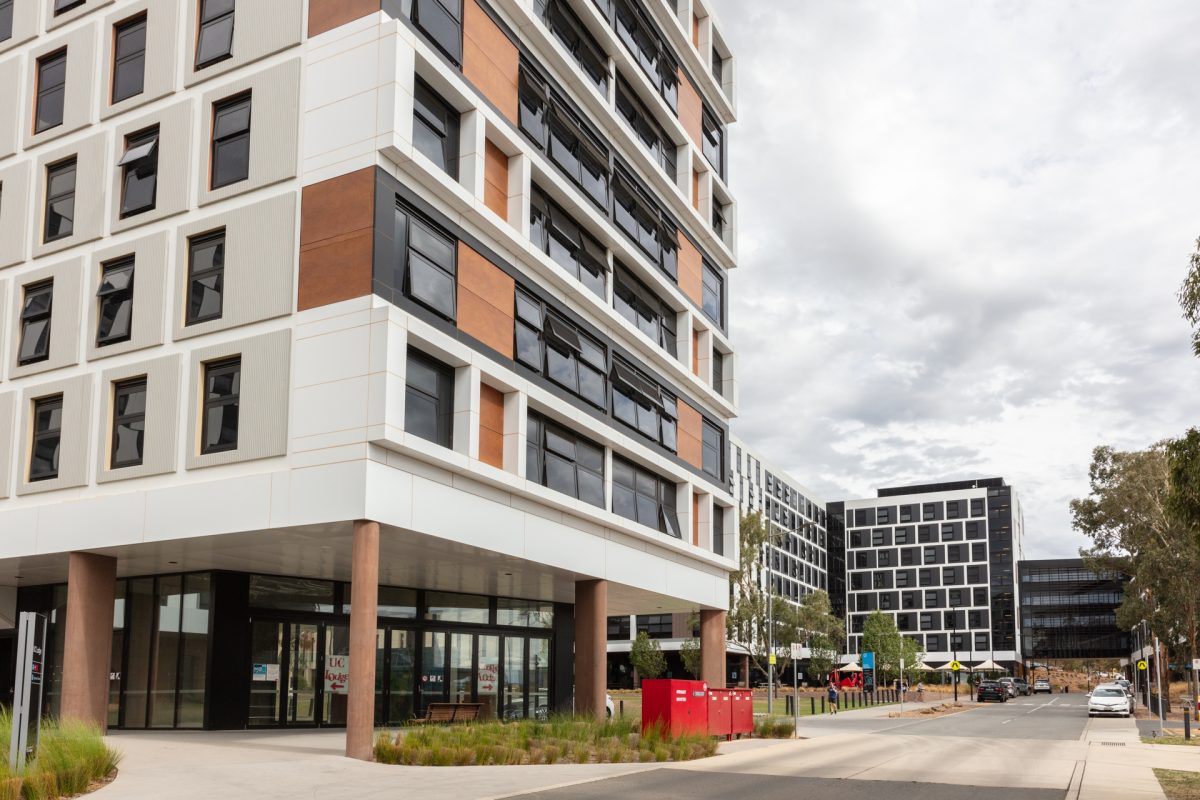
Bill Shorten plans rejuvenate the University of Canberra and sing it praises. Photo: Michelle Kroll.
On Friday, he suggested UC had undersold itself so we can expect an even more outward-facing university pitching its case to the community, making sure it knows just what great things are happening there and how important the university is to Canberra, and how the university is there for Canberra.
He also sees UC as a vehicle to deliver jobs and drive productivity, not just in Canberra but the region.
However, while doing better to sell UC to Canberra may be the priority, Mr Shorten also wants the rest of the country and the higher education sector to know about what it offers and its ‘nation-leading’ research.
He indicated that with the number of international students subsiding, UC should look to attract more mature age students wanting to retrain as part of stimulating domestic demand, seeing the university as a place of lifelong learning.
Mr Shorten also made a point of noting that UC’s current defence veterans program recognises their military service as a form of prior learning, seeing that as an avenue to provide a transition to civilian life and enrich the university.
“I say to veterans around Australia, we want you to come to UC,” Mr Shorten said.
It’s a short step to developing a closer relationship with the ADF itself.
Mr Shorten said enough to indicate that he is prepared to blow away a few cobwebs and put noses out of joint in the sector to shake things up and try fresh approaches to crack a problem.
While acknowledging the underfunding of universities and research and development, Mr Shorten suggested that the higher education sector also had to look at itself and find new ways to make its case, including in research and development where more incentives could entice the private sector to play a more prominent role.
He said the sector could also learn a few things from TAFE, joking that he wasn’t sure how Universities Australia would receive that.
Higher education had been drifting for a while, he said
“The reality is that for a generation, I think it’s increasingly the case that some Australians are not aware of what goes on in higher education, and higher education can’t rely on just being higher education and expecting support,” Mr Shorten said.
Mr Shorten seems intent not just on making an impact at UC but on the sector itself.
As an ‘interloper’ and a former politician who could be accused of suffering from relevancy deprivation syndrome, he is sure to face entrenched resistance but Mr Shorten doesn’t look like he is about to die wondering.
This isn’t a retirement transition plan but the next stage in his career.
Even the somewhat contentious decision to bring a speechwriter across with him shows that Mr Shorten envisages having a lot to say.
It’s going to be an interesting ride for the university and only time will tell if Mr Shorten was the right choice for the times.
Original Article published by Ian Bushnell on Riotact.


